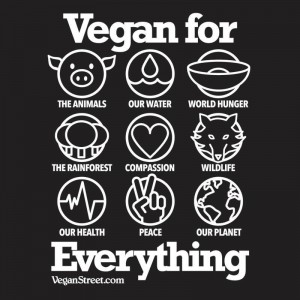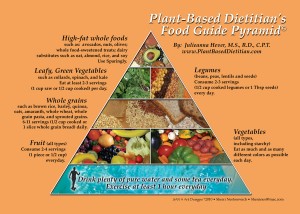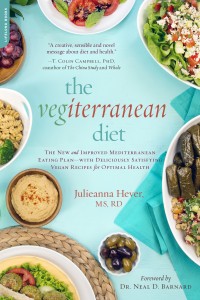 In a world with a perpetual, dynamic, and unquenchable thirst for the ideal diet, a feverish search ensues. Questions such as, “What’s better: low fat or low carb?” and “How do I lose weight and keep it off?” flood headlines of tv shows and ads, internet articles and posts, and book and magazine titles. In the golden light amidst the fog of confusion, empty promises, and emotional roller coaster rides lies one solution. Not just any solution. Not one like the usual solution riddled with trends, trickery, and false premises. No. This answer is instead backed with decades of solid science, sustainability, and simplicity. The solution is a whole food, plant-based diet. The most perfect diet we have available to us. The way of eating that prevailed for centuries…long before we figured out how to commodify animals into an alarmingly overly accessible source of food and millennia before we mastered preservation, stabilization, and packaging of foodstuff. We have always relied primarily on whole plant foods to sustain us. And thus it makes sense that our bodies heal and thrive when we swap out animal products and processed pseudo-foods with wholesome, recognizable ingredients.
In a world with a perpetual, dynamic, and unquenchable thirst for the ideal diet, a feverish search ensues. Questions such as, “What’s better: low fat or low carb?” and “How do I lose weight and keep it off?” flood headlines of tv shows and ads, internet articles and posts, and book and magazine titles. In the golden light amidst the fog of confusion, empty promises, and emotional roller coaster rides lies one solution. Not just any solution. Not one like the usual solution riddled with trends, trickery, and false premises. No. This answer is instead backed with decades of solid science, sustainability, and simplicity. The solution is a whole food, plant-based diet. The most perfect diet we have available to us. The way of eating that prevailed for centuries…long before we figured out how to commodify animals into an alarmingly overly accessible source of food and millennia before we mastered preservation, stabilization, and packaging of foodstuff. We have always relied primarily on whole plant foods to sustain us. And thus it makes sense that our bodies heal and thrive when we swap out animal products and processed pseudo-foods with wholesome, recognizable ingredients.
 Plant eaters (herbivores, if you will) have been shown to have lower body mass indexes (BMIs) and less body fat, lower total mortality – especially from ischemic heart disease, and decreased risks for high blood pressure, elevated serum cholesterol, cardiovascular disease, type 2 diabetes, and several types of cancers. In fact, a whole food, plant-based diet is the only diet ever shown to reverse disease! Namely, ischemic heart disease and type 2 diabetes. Truly, eating plants elucidates a glaringly bright light on Hippocrates’ famous decree to “let thy food be thy medicine and thy medicine be thy food.”
Plant eaters (herbivores, if you will) have been shown to have lower body mass indexes (BMIs) and less body fat, lower total mortality – especially from ischemic heart disease, and decreased risks for high blood pressure, elevated serum cholesterol, cardiovascular disease, type 2 diabetes, and several types of cancers. In fact, a whole food, plant-based diet is the only diet ever shown to reverse disease! Namely, ischemic heart disease and type 2 diabetes. Truly, eating plants elucidates a glaringly bright light on Hippocrates’ famous decree to “let thy food be thy medicine and thy medicine be thy food.”
So how does one slip seamlessly into a gloriously colorful universe filled with nutritious deliciousness? Naturally, the process evolves one step, one factoid, one skill, and one bite at a time…
Here are 10 Ways to Make Plant-Based Super Simple:
- Be a sponge. Absorb knowledge everywhere you can. Information is empowerment and the more you understand about the why’s and how’s of eating plant-based, the better you will be able to navigate your choices. The great news is that now is the best time ever to eat this way because there are boundless resources currently available to support and inspire you. From books and cookbooks to documentaries and conferences, plant-based is trending loudly and has become widely accessible to everyone. Read, watch, connect with others, and fill yourself up with facts and tips to support you on your path.
- Put on your plant goggles. When you think of food, think of plants. You have already been eating plants throughout your life in different ways, shapes, and forms, but likely did not think about it. For instance, have you ever had pasta primavera, peanut butter and jelly sandwich, a bean and rice burrito, tofu stir-fry, veggie sushi, minestrone soup, or a grilled vegetable sandwich? These are all plant-based meals that the majority of people enjoy on a regular basis. Start noticing all of the dishes you typically enjoy eating and start emphasizing those types of options, crowding out the animal-based products with wholesome plant goodness.
 Keep it simple. You do not need to be a culinary genius to eat a healthful, well-rounded plant-based diet. Boiling up some rice and lentils and adding a sauce that you bought in a bottle or whipped up in the blender is an easy, go-to meal. So is a bowl of oatmeal or green smoothie for breakfast, a veggie sandwich on whole grain bread or soup and salad for lunch, and curried vegetables with brown rice or whole-wheat pasta with marinara sauce for dinner. It doesn’t have to be extravagant, fancy, or difficult to be healthful. Cook up some skills in the kitchen by experimenting and building on what you already know. Or you can really delve in and study how to master plant-based cooking with the Rouxbe Online Professional Plant-Based Cooking School.
Keep it simple. You do not need to be a culinary genius to eat a healthful, well-rounded plant-based diet. Boiling up some rice and lentils and adding a sauce that you bought in a bottle or whipped up in the blender is an easy, go-to meal. So is a bowl of oatmeal or green smoothie for breakfast, a veggie sandwich on whole grain bread or soup and salad for lunch, and curried vegetables with brown rice or whole-wheat pasta with marinara sauce for dinner. It doesn’t have to be extravagant, fancy, or difficult to be healthful. Cook up some skills in the kitchen by experimenting and building on what you already know. Or you can really delve in and study how to master plant-based cooking with the Rouxbe Online Professional Plant-Based Cooking School.- Focus on the positive. Instead of worrying about what you will be pushing out of your diet, start looking for all of the new options that have just opened up. Perhaps you never noticed that there are dozens of varieties of leafy greens out there or several different types of lentils. What about testing out that strange looking piece of fruit you have always wondered about at the market, but never dared to purchase it and see what it is all about? Find an ingredient at the store, go home and research what to do with it, and see if you want to add that to your collection of foods you enjoy. Instead of relying on the traditional meat-and-potatoes mode of eating, your horizons can expand beyond anything you may ever have thought possible.
- Build your repertoire. With the abundance of recipes out there in books, magazines, and websites, it is fun and exciting to start hunting down meal options you absolutely love. Start searching through these resources, see what sounds good, and make a plan to try it out. Once you find a recipe that is a resounding “kale, yeah!” mark it with a heart or checkmark and save it in a special folder for you to come back to. Collect recipes that are up your alley and then use them regularly. The average person rotates through approximately 1 to 2 breakfasts, 3 to 4 lunches, and 4-6 dinner options per week, so building up an arsenal of favorites is much easier than may be expected.
 Eat the pyramid (or plate). Plant-Based Food Pyramid and Plate are perfect guidelines for how to eat overall in order to ensure nutritional accuracy. Make at least half your plate vegetables and fruits, especially those leafy greens. Include whole grains and don’t forget legumes (beans, lentils, and peas), and opt for whole food sources of healthy fats, particularly nuts and seeds, over oils, which are processed.
Eat the pyramid (or plate). Plant-Based Food Pyramid and Plate are perfect guidelines for how to eat overall in order to ensure nutritional accuracy. Make at least half your plate vegetables and fruits, especially those leafy greens. Include whole grains and don’t forget legumes (beans, lentils, and peas), and opt for whole food sources of healthy fats, particularly nuts and seeds, over oils, which are processed. Leverage leafy greens and legumes. Leafy greens and legumes are so nutritionally dense that they are a necessity as part of your daily consumption. Enjoy them often (ideally at each meal) because they will provide you with nutrients that are not so easy to find such as iron, calcium, zinc, folate, and vitamin K. Eat leafy greens cooked and raw in salads, soups, smoothies, juices, as a bed for whatever else you may be eating, in stews, pasta, and however else you can sneak them in. Legumes are excellent in stews, soups, as hummus (the best!), and other bean dips.
Leverage leafy greens and legumes. Leafy greens and legumes are so nutritionally dense that they are a necessity as part of your daily consumption. Enjoy them often (ideally at each meal) because they will provide you with nutrients that are not so easy to find such as iron, calcium, zinc, folate, and vitamin K. Eat leafy greens cooked and raw in salads, soups, smoothies, juices, as a bed for whatever else you may be eating, in stews, pasta, and however else you can sneak them in. Legumes are excellent in stews, soups, as hummus (the best!), and other bean dips. Mind your vitamin B12. Microorganisms make vitamin B12 in the soil. Animals consume them and that is how humans take in vitamin B12 in their diet, now that we sterilize our plant foods and wash away any B12 that may be left after plucking from the ground. We need vitamin B12 for neurological function, among other things, and the most reliable, safe, and least costly way to ensure you are getting your B12 is to take a supplement. Take 2000 to 2500 micrograms of vitamin B12 per week to avoid deficiency, which is inevitable on a plant-based diet if you are not minding this essential nutrient. Click here for more info on B12.
Mind your vitamin B12. Microorganisms make vitamin B12 in the soil. Animals consume them and that is how humans take in vitamin B12 in their diet, now that we sterilize our plant foods and wash away any B12 that may be left after plucking from the ground. We need vitamin B12 for neurological function, among other things, and the most reliable, safe, and least costly way to ensure you are getting your B12 is to take a supplement. Take 2000 to 2500 micrograms of vitamin B12 per week to avoid deficiency, which is inevitable on a plant-based diet if you are not minding this essential nutrient. Click here for more info on B12.- Establish a solid support system. There are plant-based lovers, herbivores, and vegans abound. You can find us online in social media, in meetup groups, and at conferences and events geared towards this world. Because it is not always easy to find likeminded individuals in your current circle, it is crucial to seek it out and connect. Having support will encourage you, help you find recipes (I bet there is no other group more excited about posting food pictures on Instagram and Facebook than are vegans), and keep you excited and inspired on your journey. Support is always a wonderful necessity
- Be your own loving, accepting, and reassuring tour guide throughout your journey. Making life changes as significant as changing your diet is quite an ordeal. It takes steps and patience and acceptance to pursue this goal, and yet that is all right. There will be setbacks and that is part of the experience. You are not alone and you have infinite reasons to celebrate all of your milestones. Be loving and gentle with yourself, as this is a wonderful, positive, exciting voyage. There is no right or wrong way to do it. So be your own cheerleader each time you succeed and your own therapist when it doesn’t go as planned. It is all your own journey and it happens slowly usually…one bite at a time.
Resources:
- Learn how to cook plant-based with the Rouxbe Online Professional Plant-Based Cooking School
- 6 Reasons Plant-Based Nutrition Is The Solution to The Healthcare Crisis
- 6 Steps Towards a Plant-Based Diet
 30 Reasons to Go Vegan
30 Reasons to Go Vegan- Physicians Committee for Responsible Medicine’s 21-Day Vegan Kickstart
- Mercy For Animals Choose Veg Starter Guide
- PETA (People for the Ethical Treatment of Animals)’s Free Vegan Starter Kit
- Vegan Outreach’s Free Guide to Cruelty-Free Eating
- My favorite resources
- Order my brand new book, The Vegiterranean Diet, for tips on meal planning, traveling, eating out, lifestyle guidance, plus 66 whole food, plant-based Mediterranean-style recipes, and much, much more
[/fusion_builder_column][/fusion_builder_row][/fusion_builder_container]









This Post Has 4 Comments
Jules~ Awesome post! People seem to have a penchant for complicating the most trivial elements of life. Thank you for providing a guide to the essence of optimal health, performance, and longevity. Om!
interesting read. thanks
Thanks for provide us such info.
Very good read and I appreciate the share.